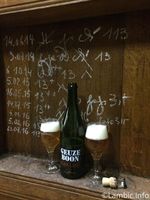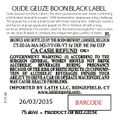Oude Geuze Boon Black Label: Difference between revisions
| (22 intermediate revisions by 5 users not shown) | |||
| Line 1: | Line 1: | ||
[[File: | [[File:Boon-Oude Geuze Black Label-Bottle-1.jpg |right|200px]] | ||
[[Brouwerij_Boon#Beers|← Boon]] | [[Brouwerij_Boon#Beers|← Boon]] | ||
__NOTOC__ | __NOTOC__ | ||
==Description== | ==Description== | ||
Oude Geuze Boon Black | Oude Geuze Boon Black Label is an oude geuze first released by Boon in November 2015 to commemorate the brewery's 40th anniversary. A subsequent second batch was released in 2016 and a third batch was released in 2017. It is bottled in 750 mL format and labeled as 7% ABV. | ||
==History / Other Notes== | ==History / Other Notes== | ||
[[File:Oude Geuze Boon Black Label.jpg|thumb|left|150px|Oude Geuze Boon Black Label batch 2 at the brewery]] | |||
The initial idea for a drier oude geuze came about when the Mikkeller brewery approached Boon for a collaboration blend. As the foeders containing the lambics that would eventually become [[Boon/Mikkeller_Oude_Geuze_Boon_Bone_Dry|Bone Dry]] would not be completely emptied, the Black Label was born. | The initial idea for a drier oude geuze came about when the Mikkeller brewery approached Boon for a collaboration blend. As the foeders containing the lambics that would eventually become [[Boon/Mikkeller_Oude_Geuze_Boon_Bone_Dry|Bone Dry]] would not be completely emptied, the Black Label was born. | ||
Oude Geuze Boon Black Label shares a similar profile to the Mikkeler and Boon Bone Dry collaboration as they were blended from the same lambic from the same foeders but in different proportions. In correspondence, the brewery noted that Black Label should be more full-bodied and slightly less dry and that there is less old lambic in the Black Label than the Bone Dry. | Oude Geuze Boon Black Label shares a similar profile to the Mikkeler and Boon Bone Dry collaboration as they were blended from the same lambic from the same foeders but in different proportions. In correspondence, the brewery noted that Black Label should be more full-bodied and slightly less dry and that there is less old lambic in the Black Label than the Bone Dry. | ||
Initial U.S. labelings of Boon Black label note a blend of 1- and 2-year old lambics. This has been acknowledged as a mistake on the labels as it is a blend of 1 | Initial U.S. labelings of Boon Black label note a blend of 1- and 2-year-old lambics. This has been acknowledged as a mistake on the labels as it is a blend of 1, 2, and 3-year-old lambics (as noted on the European label). | ||
== Bottle Log == | == Bottle Log == | ||
| Line 16: | Line 17: | ||
{| class="wikitable" border="1" | {| class="wikitable" border="1" | ||
|- | |- | ||
! Bottling date | ! Bottling date (MM/DD/YYYY) | ||
! Best by date | ! Best by date | ||
! Bottle Size | ! Bottle Size | ||
! Label / Notes | ! Label / Notes | ||
|- | |- | ||
|03/26/2015||03/26/2035|| | |03/26/2015||03/26/2035||750 mL||European labeling notes a blend of 1, 2, and 3-year-old lambic | ||
|- | |||
|03/27/2015||03/27/2035||750 mL||U.S. labeling, mistakenly notes a blend of 1 and 2-year-old lambic | |||
|- | |||
|03/30/2016||03/30/2036||750 mL||U.S. labeling, "Second Edition" on front | |||
|- | |||
|03/31/2016||03/31/2036||750 mL||European labeling, "Second Edition" on front | |||
|- | |||
|04/12/2016||04/12/2036||750 mL||European labeling | |||
|- | |||
|xx/xx/xxxx||09/05/2036||750 mL||U.S. labeling, Edition No. 3 on front | |||
|- | |||
|11/29/2017||11/29/2037||750 mL||European labeling, Edition No. 4 on front | |||
|- | |- | ||
|} | |} | ||
</center> | </center> | ||
| Line 35: | Line 47: | ||
<u>Label Text (U.S. version):</u> <br> | <u>Label Text (U.S. version):</u> <br> | ||
Oude Geuze Boon Black Label is the driest gueuze we've ever made. Combining a full-bodied taste with nearly 100% fermentation degree was a big challenge. This gueuze has a clear golden body with lively carbonation, balanced sourness and flavors of green apple and grapefruit. This is finished off with a long bone-dry aftertaste. The Lambics used for this blend have aged for 1 and 2 years on oak casks. Brewed in Lembeek, the village that gave Lambic its name. | Oude Geuze Boon Black Label is the driest gueuze we've ever made. Combining a full-bodied taste with nearly 100% fermentation degree was a big challenge. This gueuze has a clear golden body with lively carbonation, balanced sourness and flavors of green apple and grapefruit. This is finished off with a long bone-dry aftertaste. The Lambics used for this blend have aged for 1 and 2 years on oak casks. Brewed in Lembeek, the village that gave Lambic its name. | ||
==Photos== | |||
<gallery> | |||
File:Boon Black Label.jpg | |||
</gallery> | |||
[[Brouwerij_Boon#Beers|← Boon]] | [[Brouwerij_Boon#Beers|← Boon]] | ||
Latest revision as of 15:30, 4 February 2025

Description
Oude Geuze Boon Black Label is an oude geuze first released by Boon in November 2015 to commemorate the brewery's 40th anniversary. A subsequent second batch was released in 2016 and a third batch was released in 2017. It is bottled in 750 mL format and labeled as 7% ABV.
History / Other Notes

The initial idea for a drier oude geuze came about when the Mikkeller brewery approached Boon for a collaboration blend. As the foeders containing the lambics that would eventually become Bone Dry would not be completely emptied, the Black Label was born.
Oude Geuze Boon Black Label shares a similar profile to the Mikkeler and Boon Bone Dry collaboration as they were blended from the same lambic from the same foeders but in different proportions. In correspondence, the brewery noted that Black Label should be more full-bodied and slightly less dry and that there is less old lambic in the Black Label than the Bone Dry.
Initial U.S. labelings of Boon Black label note a blend of 1- and 2-year-old lambics. This has been acknowledged as a mistake on the labels as it is a blend of 1, 2, and 3-year-old lambics (as noted on the European label).
Bottle Log
| Bottling date (MM/DD/YYYY) | Best by date | Bottle Size | Label / Notes |
|---|---|---|---|
| 03/26/2015 | 03/26/2035 | 750 mL | European labeling notes a blend of 1, 2, and 3-year-old lambic |
| 03/27/2015 | 03/27/2035 | 750 mL | U.S. labeling, mistakenly notes a blend of 1 and 2-year-old lambic |
| 03/30/2016 | 03/30/2036 | 750 mL | U.S. labeling, "Second Edition" on front |
| 03/31/2016 | 03/31/2036 | 750 mL | European labeling, "Second Edition" on front |
| 04/12/2016 | 04/12/2036 | 750 mL | European labeling |
| xx/xx/xxxx | 09/05/2036 | 750 mL | U.S. labeling, Edition No. 3 on front |
| 11/29/2017 | 11/29/2037 | 750 mL | European labeling, Edition No. 4 on front |
Label
-
Front label
-
Rear label, U.S. version
Label Text (U.S. version):
Oude Geuze Boon Black Label is the driest gueuze we've ever made. Combining a full-bodied taste with nearly 100% fermentation degree was a big challenge. This gueuze has a clear golden body with lively carbonation, balanced sourness and flavors of green apple and grapefruit. This is finished off with a long bone-dry aftertaste. The Lambics used for this blend have aged for 1 and 2 years on oak casks. Brewed in Lembeek, the village that gave Lambic its name.


